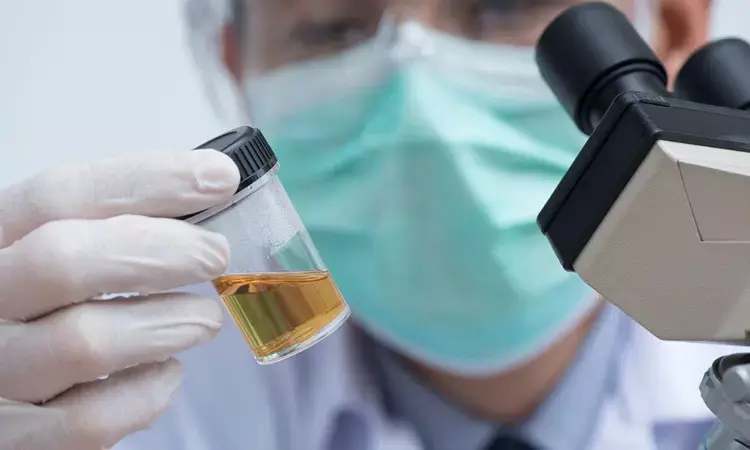- Home
- Medical news & Guidelines
- Anesthesiology
- Cardiology and CTVS
- Critical Care
- Dentistry
- Dermatology
- Diabetes and Endocrinology
- ENT
- Gastroenterology
- Medicine
- Nephrology
- Neurology
- Obstretics-Gynaecology
- Oncology
- Ophthalmology
- Orthopaedics
- Pediatrics-Neonatology
- Psychiatry
- Pulmonology
- Radiology
- Surgery
- Urology
- Laboratory Medicine
- Diet
- Nursing
- Paramedical
- Physiotherapy
- Health news
- Fact Check
- Bone Health Fact Check
- Brain Health Fact Check
- Cancer Related Fact Check
- Child Care Fact Check
- Dental and oral health fact check
- Diabetes and metabolic health fact check
- Diet and Nutrition Fact Check
- Eye and ENT Care Fact Check
- Fitness fact check
- Gut health fact check
- Heart health fact check
- Kidney health fact check
- Medical education fact check
- Men's health fact check
- Respiratory fact check
- Skin and hair care fact check
- Vaccine and Immunization fact check
- Women's health fact check
- AYUSH
- State News
- Andaman and Nicobar Islands
- Andhra Pradesh
- Arunachal Pradesh
- Assam
- Bihar
- Chandigarh
- Chattisgarh
- Dadra and Nagar Haveli
- Daman and Diu
- Delhi
- Goa
- Gujarat
- Haryana
- Himachal Pradesh
- Jammu & Kashmir
- Jharkhand
- Karnataka
- Kerala
- Ladakh
- Lakshadweep
- Madhya Pradesh
- Maharashtra
- Manipur
- Meghalaya
- Mizoram
- Nagaland
- Odisha
- Puducherry
- Punjab
- Rajasthan
- Sikkim
- Tamil Nadu
- Telangana
- Tripura
- Uttar Pradesh
- Uttrakhand
- West Bengal
- Medical Education
- Industry
Higher values of sensitive biomarker UACR tied to uncontrolled T2D

The prevalence of type 2 diabetes mellitus (T2DM) is increasing worldwide and so are the disease-associated complications. Long-term complications of diabetes cause significant morbidity and mortality.Diabetic nephropathy is one of the most common causes of chronic kidney disease (CKD) leading to end-stage renal disease (ESRD) and its prevalence is increasing because of the increasing burden of T2DM.
A recent study suggests that urine spot for albumin: creatinine ratio are higher in patients with uncontrolled type 2 diabetes and in patients with a longer duration of disease. The study findings were published online in Cureus on December 27, 2020.
For early detection of diabetic nephropathy, the American Diabetic Association (ADA) recommends screening for microalbuminuria once a year for diabetic patients. A spot morning sample for urinary albumin: creatinine ratio (UACR) is used for the screening of microalbuminuria. UACR has a direct relation to diabetic control and glycosylated hemoglobin (HbA1c) is a useful tool to assess diabetic control. Researchers of Pakistan conducted a study to report the prevalence of microalbuminuria in type 2 diabetics along with its association with diabetic control.
It was a cross-sectional study of 133 patients with T2D. The researchers evaluated co-morbidities, body mass index, mode of treatment of diabetes (oral hypoglycemic drugs and/or insulin), duration since diagnosis of T2DM, and hemoglobin A1c (HbA1c) levels. They collected morning, midstream urine sample and assessed a UACR. The study population was mostly male (60.9%) and had an average age of 54.5 years. The mean duration of diabetes in the group was 6.29 years, and mean A1C was 8.99%.
Upon analysis, they noted that 30.1% of patients had diabetic neuropathy, and 25.6% had microalbuminuria. In addition, they also found that 4.5% had macroalbuminuria.
The authors concluded, "UACR was higher in patients with uncontrolled T2DM (in terms of higher HbA1c value) and with a longer duration since diagnosis. We recommend that UACR should be inculcated in routine practice, annually, for all patients with T2DM for gauging the development of underlying renal involvement and prompt management."
For further information:
https://www.cureus.com/articles/48006-prevalence-of-microalbuminuria-in-type-2-diabetes-mellitus
Dr Kartikeya Kohli is an Internal Medicine Consultant at Sitaram Bhartia Hospital in Delhi with super speciality training in Nephrology. He has worked with various eminent hospitals like Indraprastha Apollo Hospital, Sir Gangaram Hospital. He holds an MBBS from Kasturba Medical College Manipal, DNB Internal Medicine, Post Graduate Diploma in Clinical Research and Business Development, Fellow DNB Nephrology, MRCP and ECFMG Certification. He has been closely associated with India Medical Association South Delhi Branch and Delhi Medical Association and has been organising continuing medical education programs on their behalf from time to time. Further he has been contributing medical articles for their newsletters as well. He is also associated with electronic media and TV for conduction and presentation of health programs. He has been associated with Medical Dialogues for last 3 years and contributing articles on regular basis.
Dr Kamal Kant Kohli-MBBS, DTCD- a chest specialist with more than 30 years of practice and a flair for writing clinical articles, Dr Kamal Kant Kohli joined Medical Dialogues as a Chief Editor of Medical News. Besides writing articles, as an editor, he proofreads and verifies all the medical content published on Medical Dialogues including those coming from journals, studies,medical conferences,guidelines etc. Email: drkohli@medicaldialogues.in. Contact no. 011-43720751


